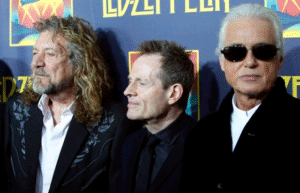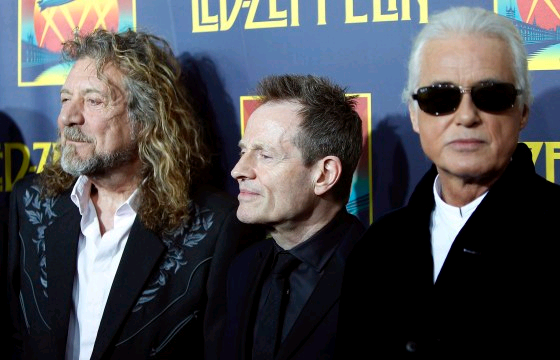Breaking news Led Zeppelin Clash with Reporters at New York Press Conference**
On a chilly winter morning in 1969, the streets of New York City were buzzing with excitement as the city’s music enthusiasts gathered outside the legendary Plaza Hotel to catch a glimpse of the world’s most talked-about rock band, Led Zeppelin. The group, consisting of guitarist Jimmy Page, drummer John Bonham, bassist/keyboardist John Paul Jones, and lead vocalist Robert Plant, had arrived in the Big Apple to promote their latest album, _Led Zeppelin II_. However, what was expected to be a cordial and informative press conference quickly turned into a chaotic and contentious affair, as the band members clashed with a horde of aggressive reporters.

The conference, which was held in the hotel’s opulent ballroom, was packed with journalists from some of the top music publications of the time, including _Rolling Stone_, _Creem_, and _The New York Times_. As the band members took their seats at a long table, the room fell silent, with all eyes fixed on the lanky figure of Robert Plant. The charismatic frontman, known for his powerful vocals and poetic lyrics, smiled warmly at the sea of faces before him.
However, the pleasant atmosphere was short-lived, as a scrappy reporter from the _New York Daily News_ immediately began firing off questions at the band. “Jimmy, your music is said to be influenced by blues and folk, but it’s also been criticized for being too loud and raw. How do you respond to these claims?” The question was met with a dismissive snort from Page, who shot back, “We’re not trying to be some sort of novelty act. Our music is genuine, and if people can’t handle it, that’s not our problem.”
The reporter persisted, pushing Page to elaborate on his band’s unique sound. Page, however, was not in the mood for small talk and curtly replied, “Look, we’re not going to be bound by some predetermined notion of what rock music should be. We’re doing our own thing, and if people don’t like it, that’s fine.”
Meanwhile, another reporter from _Rolling Stone_ jumped into the fray, asking John Bonham about the band’s notorious partying reputation. “John, it’s been reported that you and Jimmy have been indulging in some pretty wild behavior on tour. Can you comment on these allegations?” Bonham, never one to mince words, shot back with a sly grin, “Oh, you mean the rumors about us being a bunch of wild kids who can’t control ourselves? Well, I suppose that’s a bit of an exaggeration. We do enjoy a good time, but we’re not animals.”
The exchange quickly devolved into chaos as more reporters began shouting out questions and comments. John Paul Jones, who had been quietly observing the exchange, suddenly stood up and began to speak in a deep, rumbling voice. “Look, guys, we’re here to talk about our music, not to indulge in some sort of sensationalized gossip. Can we please just have a civilized conversation?” The room fell silent once more as the reporters looked at each other sheepishly.
However, Robert Plant’s patience had worn thin. As he began to speak, his voice took on a slightly sarcastic tone. “You know, it’s really quite fascinating how you all seem to be so interested in our personal lives. Can’t you just focus on what we’re here to talk about – our music?” Plant’s words were met with a mixture of giggles and groans from the reporters.
As the conference continued to spiral out of control, Jimmy Page finally had had enough. With a look of exasperation on his face, he slammed his fist on the table and declared, “That’s it! We’re done here!” With that, the band members jumped up from their seats and stormed out of the ballroom, leaving a sea of bewildered reporters in their wake.
As they made their way back to their hotel rooms, the band members couldn’t help but share a laugh at the absurdity of it all. “Well, I guess that was fun,” John Bonham chuckled. “I never thought I’d say this, but I’m actually glad we got out of there before things got any worse.”
Robert Plant nodded in agreement. “Yeah, it’s just another day in the life of Led Zeppelin. We’re used to stirring up controversy wherever we go.”
Jimmy Page smiled wryly. “And we’re not finished yet. We’ve got a whole tour ahead of us, and I’m sure there will be plenty more where that came from.”
As the band members dispersed to their respective rooms, they couldn’t help but feel a sense of satisfaction at having stood up for themselves against the media machine. After all, as Robert Plant would later say in an interview with _Rolling Stone_, “We’re not just a rock band – we’re a force of nature.”
The incident would go down in rock history as one of the most infamous press conferences ever held by a major band. And while it may have caused a stir at the time, it ultimately only added to Led Zeppelin’s enigmatic allure and further solidified their reputation as one of the most groundbreaking and uncompromising bands of all time.
**Legacy of the Incident**
The Led Zeppelin press conference debacle would have far-reaching consequences for the band and their relationship with the media. In the years that followed, they would continue to push boundaries and challenge the status quo with their music and public persona.
Their next album, _Led Zeppelin III_, would see them experimenting with new sounds and styles, while their live performances would become increasingly theatrical and immersive. The band’s relationship with their fans would also become more direct and personal, with Plant taking on a more prominent role as a spokesperson and ambassador for the group.
In hindsight, the New York press conference incident can be seen as a turning point in Led Zeppelin’s career. It marked a moment when they refused to be bound by conventional expectations or intimidated by the pressures of fame. Instead, they chose to forge their own path and create their own rules – a decision that would ultimately define their legacy as one of the most innovative and influential rock bands of all time.
**Impact on Rock Journalism**
The Led Zeppelin press conference incident also had a lasting impact on rock journalism. It highlighted the need for more thoughtful and nuanced reporting on rock music and its practitioners. Gone were the days when reporters could simply focus on sensationalizing scandals or exploiting controversy.
Instead, writers began to take a more serious approach to covering rock music – exploring its cultural context, its artistic merits, and its social significance. This shift towards more informed and thoughtful reporting helped to elevate rock journalism as a whole and paved the way for future generations of music writers.
In conclusion, the Led Zeppelin press conference incident in New York City remains one of the most enduring and fascinating moments in rock history. It showcased the band’s unbridled energy and creativity while also highlighting their unwillingness to be bound by conventional expectations.
As we look back on this pivotal moment in time, we are reminded of the enduring power of rock music to challenge societal norms and push boundaries. Led Zeppelin’s defiant response to their critics serves as a testament to their unwavering commitment to their art – a commitment that continues to inspire new generations of musicians and fans alike.
And so, let us remember this chaotic press conference as a testament to Led Zeppelin’s sheer force of will – a reminder that even in the face of adversity and criticism, true artists will always find a way to stand tall and create something truly remarkable.
—
For more information about this topic or other AI-generated content related to Led Zeppelin or Music History in general please refer:



